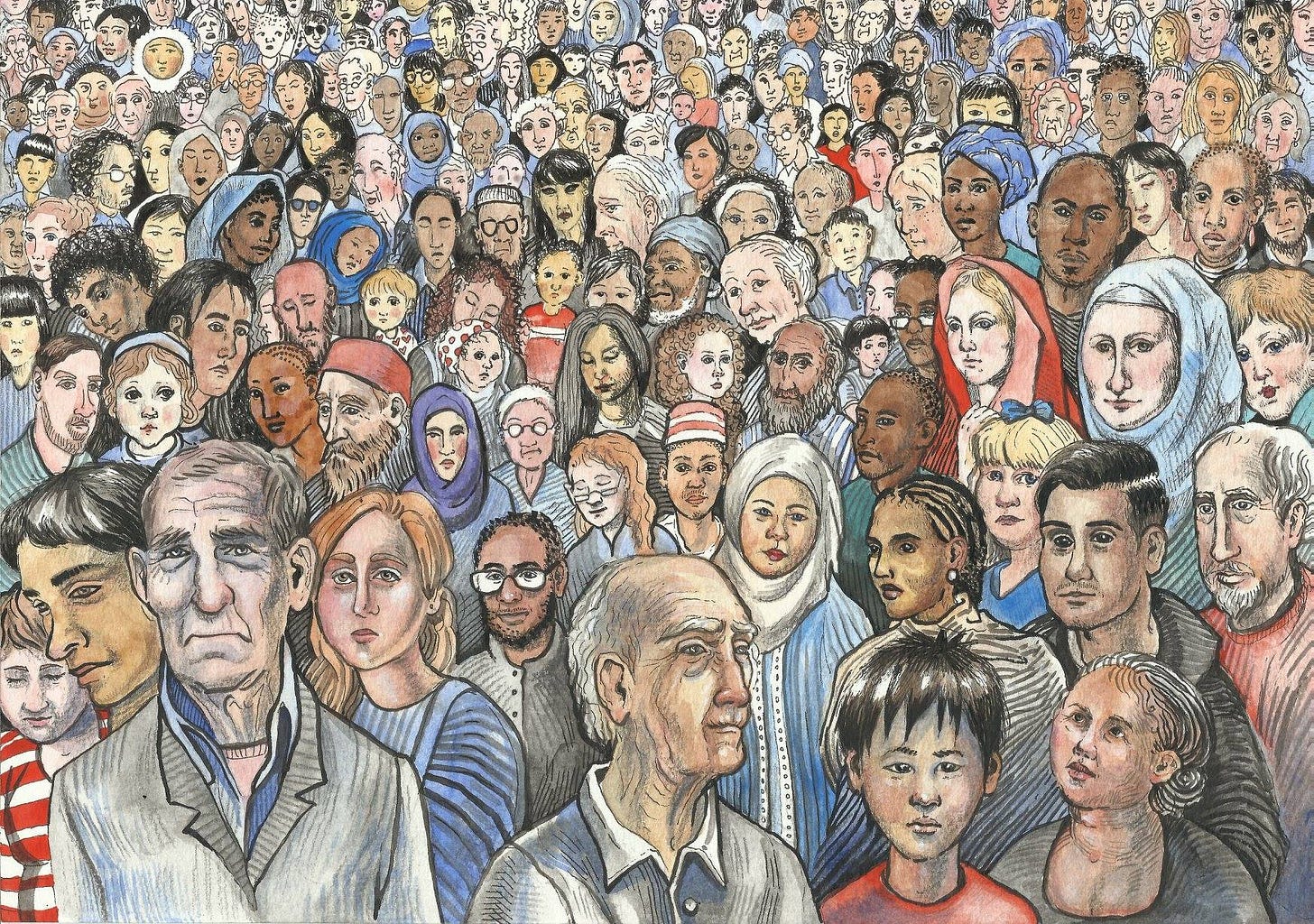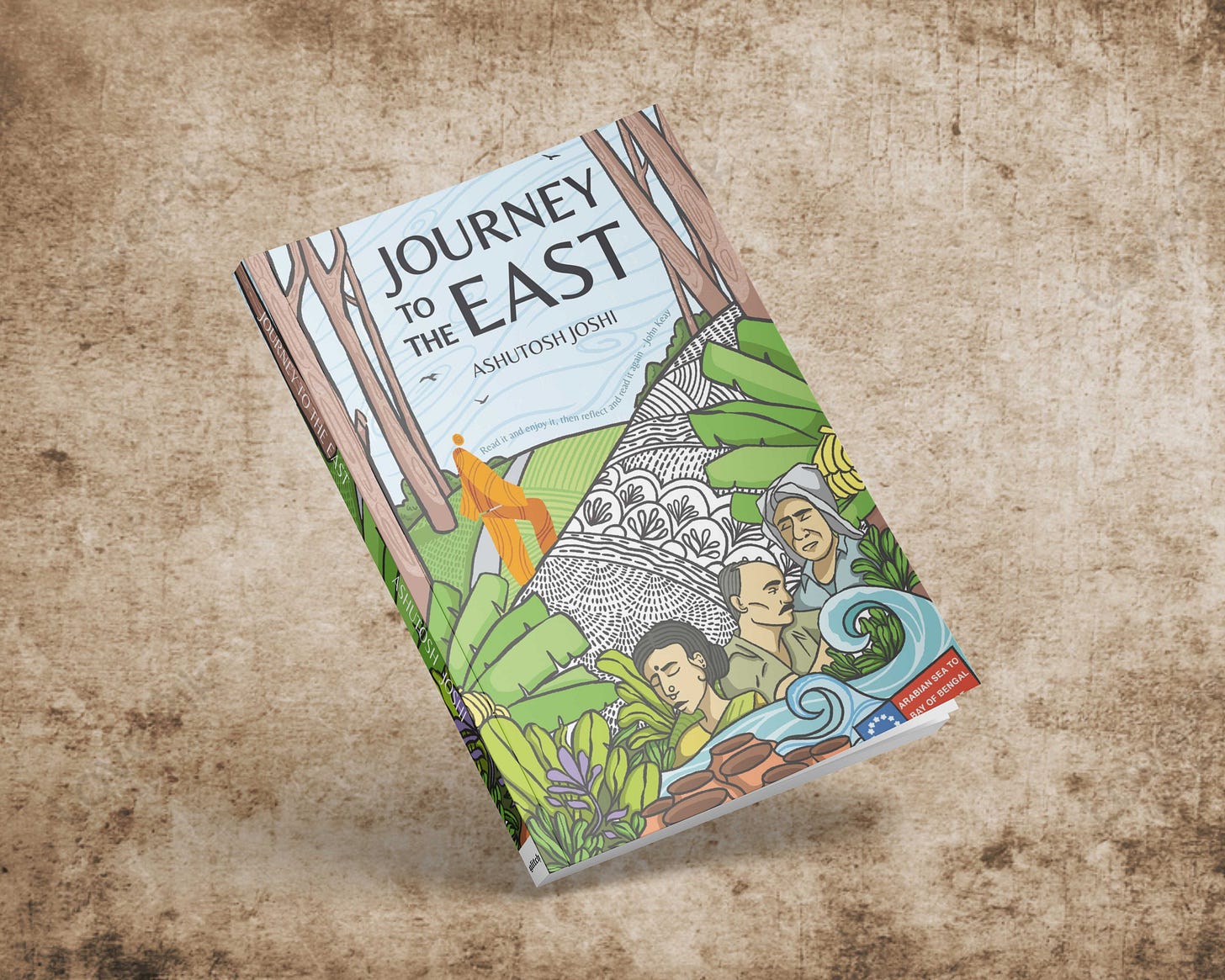Common Ground
Discovering Shared Humanity in a Fragmented World
I have been thinking lately - about our shared earth. I remember when I was in England, I would write about the problems that I saw in the English society. Contrary to the English, when I lived in the Scottish countryside, I spoke about the wilderness, the friendly nature of people and about the right to roam. Yet, whenever I write, I find that, either people from my country or people from the western countries, someone tends to get offended. They say, I don’t talk enough good things about India when I write about a critical topic and then they say you always talk bad stuff about the English, when it’s a critical observation of their society. But, that’s not all that I speak of, I speak about good things too. I feel, until I have hate coming from all sides, I should be fine. I know that I am doing the right thing then.
during our podcast, introduced me to the Indian/English writer Pico Iyer, who has had a profound impact on my thoughts lately. More than impact, I felt a sense of belonging in his writings. For some reason, I always feel that I don’t fit in anywhere. Nor did I fit in in the Western society and nor am I able to fit in totally in my Indian society. For Indians my ideas are too forward and foreign and for my western friends my ideas were too exotic. I have always tried to walk on that tight rope. Pico Iyer made me realise that the experience I have had on my travels, coupled with the life of constant movement, I have turned into more of a pan-global mind rather than a particularly Indian or a Western one - atleast when it comes to cultural thinking.I remember in England, one thing that I hated the most, was people asking me silly questions about India and Indian food, when they met me for the first time.. They would nod their heads and ask me to do the same - and before someone comes up and says that’s so racist, I would like to add that it wasn’t. I come from a culture that likes to mock people in a friendly way and this I took like a sport. Maybe that was why no one could intimidate me. Many of those intimidating people actually ended up being my closest friends. Now, although I nod my head a bit, it’s not as if my head is in a constant motion and although I like good Indian food, I don’t know how to make butter chicken. To be honest, I had never even heard of ‘butter-chicken’ or ‘Vindaloo’ before I read it on a menu in an English-Indian restaurant. It’s strange how cultures bring up their citizens in a conforming way, making the ‘other’ so exotic that they forget to realise that they actually have a lot in common. Like we all are waking up, eating different kinds of food, working in order to pay rent. We might support different sides during a war but really we are not that different. Leave alone the ideologies and the government shoving propaganda down our throats, and we see that nothing really exists. It’s just us leading our simple lives in some corner of the world. Just trying to be.
It’s sad really that we are made to choose a side these days. Rather than finding a common ground, we are always on the lookout for that one thing that we know we hate about the other. That one opinion that the other person might hold, that might not align with your perception of reality, or rather what you want to be real and right.
I have almost come to this point in my life where I don’t really care what opinion the other person holds. I know that there is a light of God - maybe its dimmed out for some while - but it is definitely there. I approach people without opinions. I approach them because they have a story to tell. I talk to them and meet them because behind all that veil of insecurity and uncertainty, there is a just a simple being who wants to be loved. Today we praise for Labour, tomorrow for Tories, today Modi, tomorrow Gandhi, but ask yourself this, here in our hyper-personal life, does any of that really matter?
Furthermore, the digital age has amplified these pressures. Social media platforms, while ostensibly designed to connect us, often highlight our differences and fuel a culture of comparison. The curated lives we see online create unrealistic benchmarks for success and happiness, leading to widespread dissatisfaction. It's a global phenomenon that transcends cultural boundaries, affecting individuals regardless of their background. The omnipresence of technology and the internet means that our lives are increasingly intertwined, yet paradoxically, we often feel more isolated than ever. As Sherry Turkle, a professor at MIT, notes in her book "Alone Together": “Technology is seductive when what it offers meets our human vulnerabilities. And as it turns out, we are very vulnerable indeed. We are lonely but fearful of intimacy.”
In conversations with friends of my age, from various parts of the world, a common theme emerges: a yearning for authenticity. People crave genuine connections and experiences, yet they often feel trapped in a cycle of superficial interactions and material pursuits. This disconnection from our true selves and from each other can lead to a sense of existential emptiness. The fast-paced nature of modern life, coupled with the incessant bombardment of information, leaves little room for introspection and meaningful engagement. How am I to have a decent discussion with someone if I am already viewing him through a biased lens?
As I navigate these complexities, I am reminded of the wisdom in Pico Iyer's writings. His reflections on the interplay between cultures, the importance of inner stillness, and the pursuit of a meaningful life resonate deeply with me. He speaks of finding a home within oneself, a sense of belonging that transcends geographical and cultural boundaries. This concept has become increasingly significant in my own journey. As Iyer beautifully puts it, “We travel, initially, to lose ourselves; and we travel, next, to find ourselves.” I find this to be true, especially in the point of time I find myself in. Most of my friends are addicted to one or the other form of media and here I am, still trying to find people who don’t even use social media. I feel an instant connection with them. Maybe I am oldskool, I don’t know!?
This approach to life has brought me to a deeper understanding of compassion and empathy. The more I travel and engage with people from diverse backgrounds, the more I realize how much we have in common. We all experience joy and sorrow, hope and despair, love and loss. These universal experiences bind us together in ways that transcend cultural, social, and political boundaries. By focusing on these shared human experiences, I find it easier to connect with others, even when our external circumstances and beliefs might differ greatly.
Yes, we need to talk critically about our problems but it doesn’t mean that we should harm ourselves in the process.
Take, for instance, a conversation I had with a farmer in rural Scotland. Despite our vastly different upbringings and life experiences, we found common ground in our love for nature and our concerns about the environment. Our discussion was not about who was right or wrong but about understanding each other's perspectives and learning from them. This farmer, who had lived his entire life in a small village, taught me valuable lessons about sustainability and the importance of community. In turn, I shared my experiences from different parts of the world, creating a mutual exchange of ideas and values. This interaction reinforced my belief that meaningful connections can be made when we approach each other with an open heart and a willingness to listen.
Furthermore, this perspective has influenced my writing. I strive to highlight both the beauty and the challenges within every culture I encounter. It is not about painting a rosy picture or focusing solely on the negatives, but about presenting a balanced view that acknowledges the complexities of human societies. By doing so, I hope to foster a greater understanding and appreciation of our shared humanity. Whether I am writing about the vibrant festivals of India or the serene landscapes of Scotland, my goal is to capture the essence of these places and the people who inhabit them. In doing so, I aim to bridge the gap between different cultures and promote a sense of global unity.
In today's world, where division and conflict seem to be ever-present, it's more important than ever to cultivate empathy and understanding. We need to move beyond the superficial differences that separate us and focus on the commonalities that unite us. By doing so, we can create a more compassionate and inclusive world, where everyone feels valued and understood. It's a challenging path, but one that is worth pursuing. As Pico Iyer eloquently said, "The best way to live is by seeing everyone you meet as a brother or sister. When you do that, you won't need anything more." Isn’t this simple yet extremely profound?
So, as we navigate these turbulent times, perhaps the most important question we can ask ourselves is this: How can we open our hearts and minds to truly see and embrace the shared humanity in those around us?
“Journey to the East”- is currently available as a paperback through my website and on Amazon Kindle globally.
If you would like to help me out in other ways, you can buy me a coffee via paypal, www.paypal.me/ashutoshjoshistudio.
If you would like to buy prints of my photographs, you can choose the photographs you like on my website and send me an email. I will send you custom quotes for the sizes you’d like.





I'm a fan of Pico Iyer as well. His writing is sublime, so simple, so elegant, so full of humanity and humility. You couldn't find a better mentor.